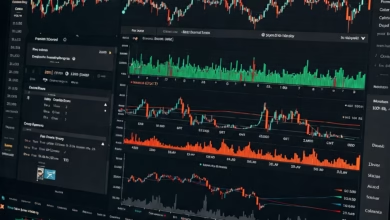How to emotionally survive a sudden stock market crash
Understand how to act in times of stock market crisis

The stock market can be a rollercoaster, and while the ups are exhilarating, the downs can be terrifying. A sudden market crash isn’t just about financial loss; it can trigger a cascade of difficult emotions, from anxiety and panic to regret and despair. But it doesn’t have to paralyze you. Learning how to manage your emotional response is just as crucial as managing your investments.
Understanding the Emotional Rollercoaster of Market Crashes

When the market plummets, it’s normal to feel a range of intense emotions. Many investors experience the five stages of grief: denial, anger, bargaining, depression, and acceptance. Initially, you might deny the severity of the situation, then feel anger at the market or even yourself. Bargaining might involve hoping for a quick rebound, followed by sadness or depression as losses accumulate. The ultimate goal is to reach acceptance, allowing you to make rational decisions.
Recognizing these feelings for what they are – a natural response to uncertainty and perceived loss – is the first step in regaining control. Your brain is wired to react to threats, and a market crash can feel like a significant one.
Practical Strategies to Safeguard Your Mental Well-being During Downturns
It’s one thing to understand your emotions, and another to manage them effectively. Here are practical strategies to help you navigate market volatility with a clearer head:
Focus on What You Can Control (and Let Go of What You Can’t)
You can’t control market movements, global events, or investor sentiment. What you can control are your reactions, your investment strategy, and your financial habits. Shift your focus from the daily fluctuations to your long-term plan. This mindset helps reduce feelings of helplessness.
Avoid Constant Portfolio Checking: Less is Often More

One of the biggest pitfalls during a market crash is obsessively checking your portfolio. Watching your wealth diminish in real-time can amplify anxiety and lead to impulsive decisions. Set limits: perhaps check once a day, or even once a week. Resist the urge to constantly refresh your screen.
Revisit Your Financial Plan: Are You Still on Track?
A market downturn is not the time to abandon your well-thought-out financial plan. Instead, it’s an opportunity to revisit it. Remind yourself of your initial goals, risk tolerance, and diversification strategy. If your plan was solid from the start, a temporary dip shouldn’t derail it. This reinforces a sense of stability and purpose.
Diversify Your Investments: Don’t Put All Your Eggs in One Basket
While diversification is an investment strategy, it’s also a powerful emotional shield. A well-diversified portfolio, spread across different asset classes (stocks, bonds, real estate, etc.), industries, and geographies, helps mitigate the impact of a downturn in any single area. This reduces the “all or nothing” feeling and provides a sense of security.
Building Long-Term Resilience: Beyond the Current Downturn

Surviving one crash is great, but building long-term emotional resilience for future market volatility is even better.
Educate Yourself Continuously: Knowledge is Power (and Calm)
The more you understand about how markets work, historical cycles, and the principles of long-term investing, the less frightening downturns become. Read reputable financial news, books, and articles. Knowledge demystifies the market and replaces fear with understanding.
Practice Mindfulness and Stress Reduction Techniques
Beyond finance, incorporating mindfulness, meditation, deep breathing exercises, or even regular physical activity can significantly improve your ability to cope with stress, financial or otherwise. A calm mind makes better decisions.
Talk to a Trusted Financial Advisor (or a Supportive Friend/Family Member)
If the emotional weight becomes too heavy, don’t hesitate to reach out. A professional financial advisor can provide objective guidance, help you stick to your plan, and offer reassurance. Sharing your concerns with a supportive friend or family member who understands your situation can also be incredibly therapeutic.
The Silver Lining: Opportunities in Adversity

While emotionally challenging, market crashes also present opportunities for long-term investors. For those with a stable income and a long investment horizon, downturns can be a chance to buy quality assets at discounted prices, effectively “buying the dip.” This perspective shift can turn a period of fear into one of strategic advantage.
Remember, market downturns are a normal part of the economic cycle. By understanding your emotions, implementing practical coping strategies, and focusing on your long-term goals, you can not only survive but thrive emotionally and financially through even the most turbulent times.





